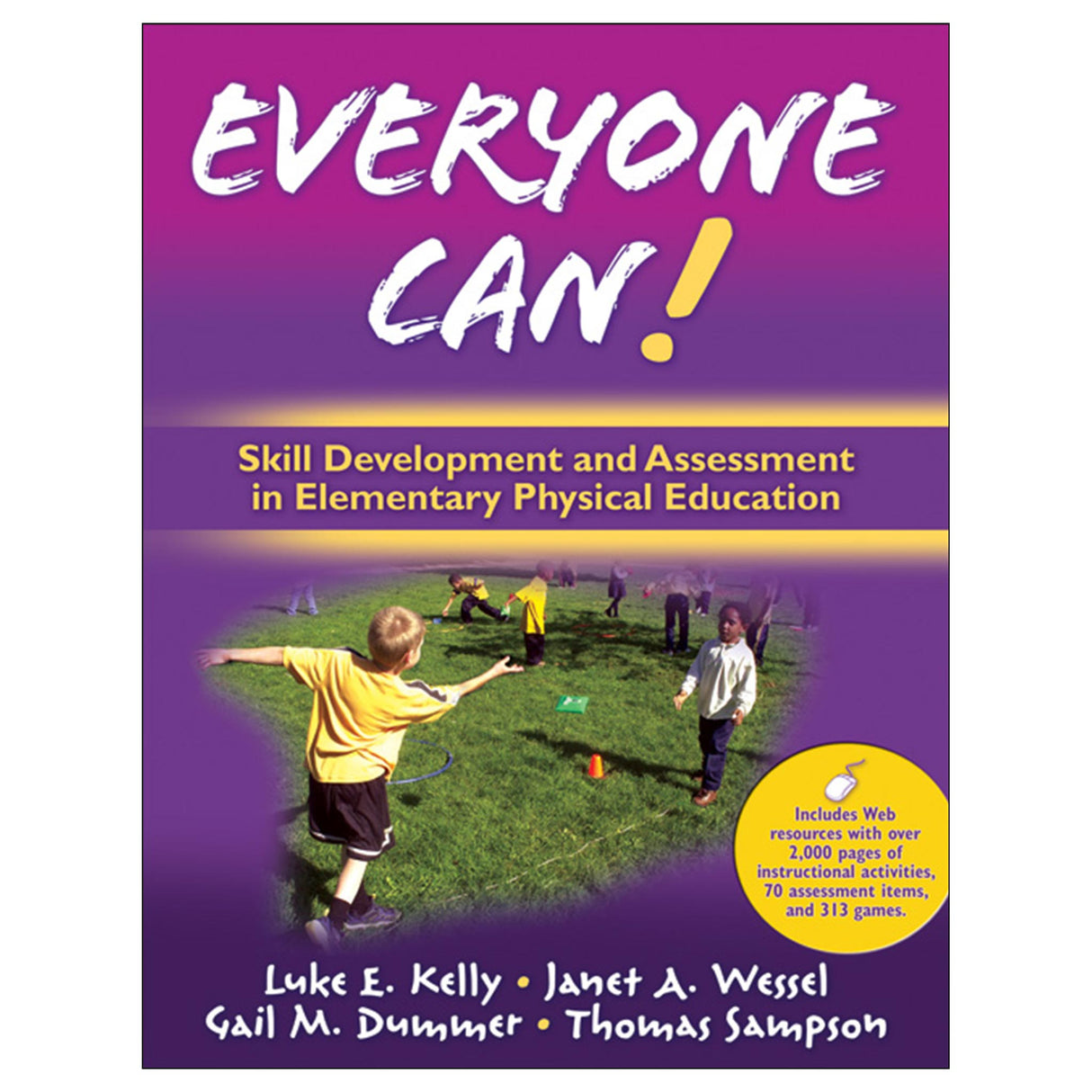Everyone Can! PDF
Skill Development and Assessment in Elementary Physical Educatn w/Web Resources
$50.00 USD
Access Duration: 10 Years
Enter Everyone Can!: Skill Development and Assessment in Elementary Physical Education. This book and website package offers a wealth of information from the Achievement-Based Curriculum model that addresses the needs of all students. That includes kids who are ready for extension activities, those who are developing typically, those who have not yet mastered the essential skills but have no disability, and those who have disabilities.
Everyone Can! offers
- over 2,000 pages of assessment-based instructional activities and 313 games that provide you with a systematic way to foster and monitor student learning;
- 70 curriculum-embedded assessment items and 140 score sheets;
- an in-depth explanation of how to best use the instructional activities, games, and score sheets provided in the online resource; and
- hundreds of portable teacher task cards, which allow you to print an activity or game card from the Web and carry it with you to the gym or field.
This resource offers you a wide selection of content to help you meet NASPE, NCPERID, and APENS standards—but it does more than just help you meet national or state standards. It provides you with step-by-step guidance in designing and implementing just the curriculum you need, as well as evaluating student progress and program effectiveness. Anchored in the Achievement-Based Curriculum (ABC) model of PE curricular design, it provides concrete examples to illustrate each step of the ABC model and guides you through a series of decisions to help you choose your program content and how to best teach that content based on student performance. Once you have designed the curriculum, you have a storehouse of resources—including more than 2,000 online pages—to use in implementing your program.
Everyone Can! doesn’t separate out adapted activities; you will find these adaptations throughout the resource. In fact, the hundreds of games and activities in this ready-to-use package come with extensive accommodations, helping you to be inclusive and effective, regardless of a child’s skill level.
This systematic resource provides you with a comprehensive physical education approach right at your fingertips, saving time and energy while offering you concrete guidance in creating or improving your physical education program. In other words, this quintessential elementary physical education package will free you up so everyone can achieve and succeed!
Preface
Acknowledgments
How to Use This Book and Online Resource
Part I: Everyone Can! Achievement-Based Curriculum (ABC)
Chapter 1. ABC Program Planning
Step 1: Establish a Program Philosophy, Goals, and Objectives
Step 2: Assign Program Goal Emphasis
Step 3: Determine Instructional Time and Average Objective Mastery Time
Step 4: Calculate the Total Number of Objectives Per Goal
Step 5: Finalize Program Scope and Sequence
Step 6: Create Yearly Teaching Learning Maps
Step 7: Identify Objective Assessment Items and Create Scoresheets
Summary
Chapter 2. Assessment
Step 1: Determine What Objectives Should be Assessed
Step 2: Select an Appropriate Assessment Instrument
Step 3: Score and Record Performance
Step 4: Select an Assessment Activity
Step 5: Conduct an Assessment Activity
Step 6: Conduct Other Forms of Assessment
Summary
Chapter 3. Implementation Planning
Step 1: Set Student Initial and Target Learning Expectations
Step 2: Identify Student Learning Needs
Step 3: Create Instructional Groupings Based on Focal Points
Step 4: Select Learning Activities
Step 5: Design Teaching Templates and Student Learning formats
Summary
Chapter 4. Teaching
Step 1: Get Ready
Step 2: Maximize On-Task Time
Step 3: Apply Essential Teaching Elements
Step 4: Put It All Together
Summary
Chapter 5. Evaluation
Step 1: Collect Reassessment Data
Step 2: Calculate, Interpret, and Report Student Performance
Step 3: Evaluate and Grade Students’ Progress
Step 4: Evaluate Your Program
Step 5: Use Technology to Aid in Education
Step 6: Establish Program Accountability and Justification
Part II: Everyone Can! Online Resources
Chapter 6. Model K-5 Program Plan
Step 1: Develop Program Philosophy, Goals, and Objectives
Step 2: Establish Program Goal Emphasis
Step 3: Calculate Instructional Time and Average Mastery Time
Step 4: Calculate Amount of Content to Include in the Curriculum
Step 5: Sequence Content Across the Curriculum
Step 6: Create Yearly and Block Teaching and Learning Maps
Summary
Chapter 7.Using the Everyone Can! Online Resource Materials
How to Access the Everyone Can Online Resource
Online Resource Menus
Selecting an Objective from the Main Menu
Exploring the Instruction Materials
Using the Online Resources
Methods for Printing Posters
Other Uses for the Everyone Can Resources
Using Everyone Can for Individualized Education Programs
Summary
Chapter 8. Incorporating the ABC Model Into Your Program
Designing an In-Service Program
Managing Change
Summary
About the Authors





